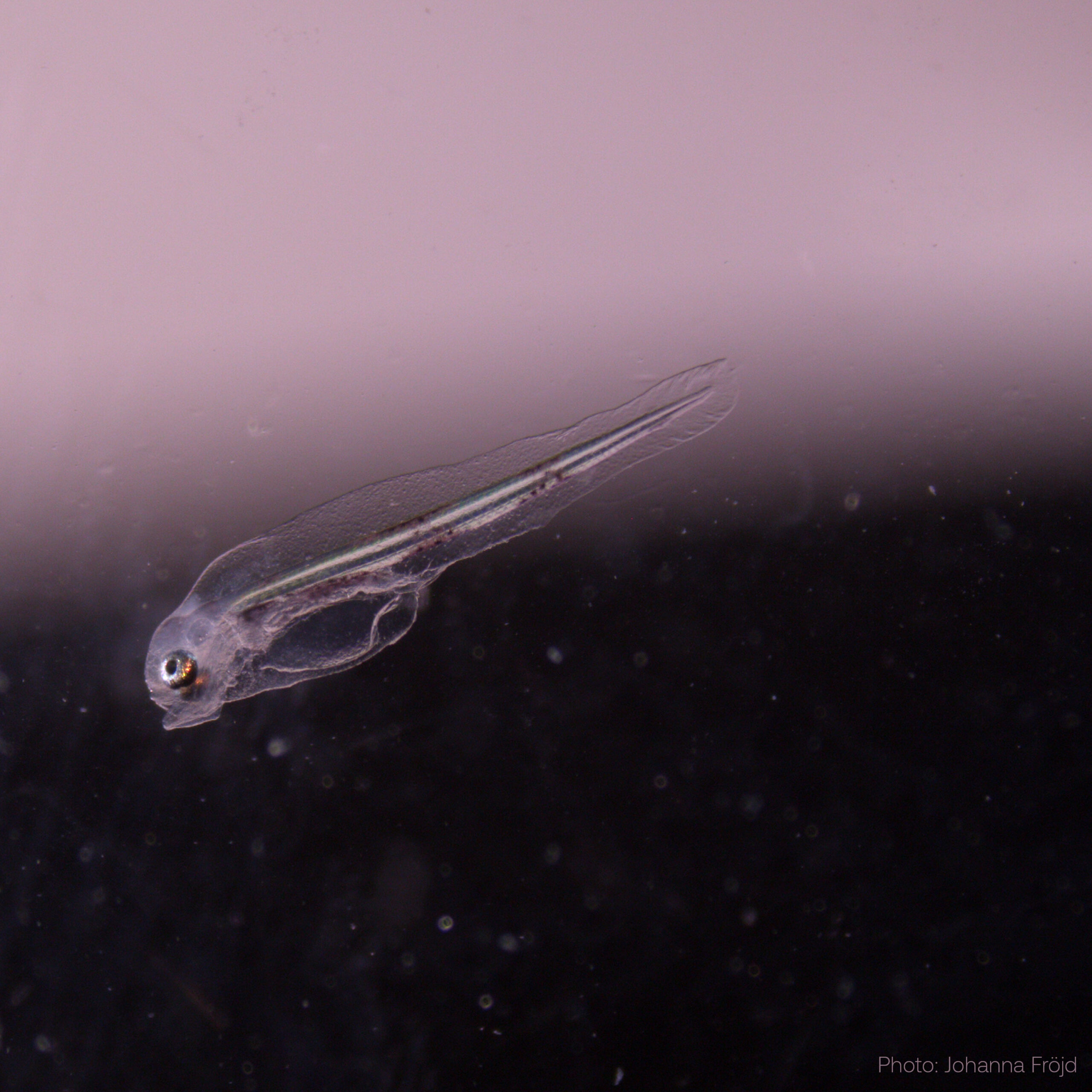Human impacts and climate change threaten Baltic Sea cod. Within the ReCod project, cod larvae releases have emerged as a possible way to strengthen the stock. Several research projects funded by
BalticWaters are ongoing at the same time with the aim of increasing knowledge about Baltic cod. In one project, Sebastian Politis will use molecular tools to investigate how the larvae’s tolerance to oxygen, salinity and temperature affects their survival in the Baltic Sea.
The Baltic Sea marine environment is under constant change. While human impacts have greatly altered its environmental conditions, climate change is expected to cause further changes to the already highly stressed marine environment. This creates new challenges for species adapted to the unique environment of the Baltic Sea – not least the Baltic cod which, after decades of overfishing and mismanagement, is facing an urgent situation.
One reason why cod stocks have not been able to recover is that cod depend on specific levels of salinity and oxygen to reproduce – levels that are in principle only met in the Bornholm Deep in the Baltic Sea. In 2020, the first step of the project ReCod – release of small cod in the Baltic Sea was launched to test whether releasing cod larvae, reared in a research laboratory, can support long-term stock recovery.
The project has already led to many new insights. But when it comes to cod larvae adapting to different environmental conditions, there is still much to learn.

– To give the larvae the best possible chance of survival, we need to get a clear picture of how they are affected by different environmental conditions, says Sebastian Politis, researcher at the Technical University of Denmark (DTU).
Sebastian is a researcher in experimental biology with a special focus on how organisms adapt to their environment. Within ReCod, he is now leading a project where he will use molecular tools to investigate how different environmental conditions affect the development and survival of cod at different early life stages.
ReCod will help cod past the vulnerable egg stage
For successful reproduction, cod eggs should float somewhat above the bottom, but the oxygen-poor seabed and low salinity mean that the eggs instead sink to the bottom and die. Today, there is only one place left in the southern Baltic Sea with the conditions needed for cod to successfully reproduce – the Bornholm Deep. ReCod – release of small cod in the Baltic Sea started with the aim of testing whether it is possible to help cod past the vulnerable egg stage and thus increase the number of small cod in the sea as a step in strengthening stocks.
How cod tolerance changes – from embryo to larva
The project focuses on three key environmental parameters for the early development and survival of cod: salinity, oxygen and temperature. When the cod larvae are reared within ReCod, it is under optimal environmental conditions, but when the larvae are then released into the Baltic Sea, they encounter a more varied environment that risks stressing the sensitive larvae.
It is likely that tolerance to salt, oxygen and temperature changes as cod develop – from embryo to larva. But so far, the tolerance limits through the early life stages of cod are unknown, which is something the project will investigate.
– In order to optimise survival in the Baltic Sea, we need to understand where their tolerance limits are, says Sebastian.
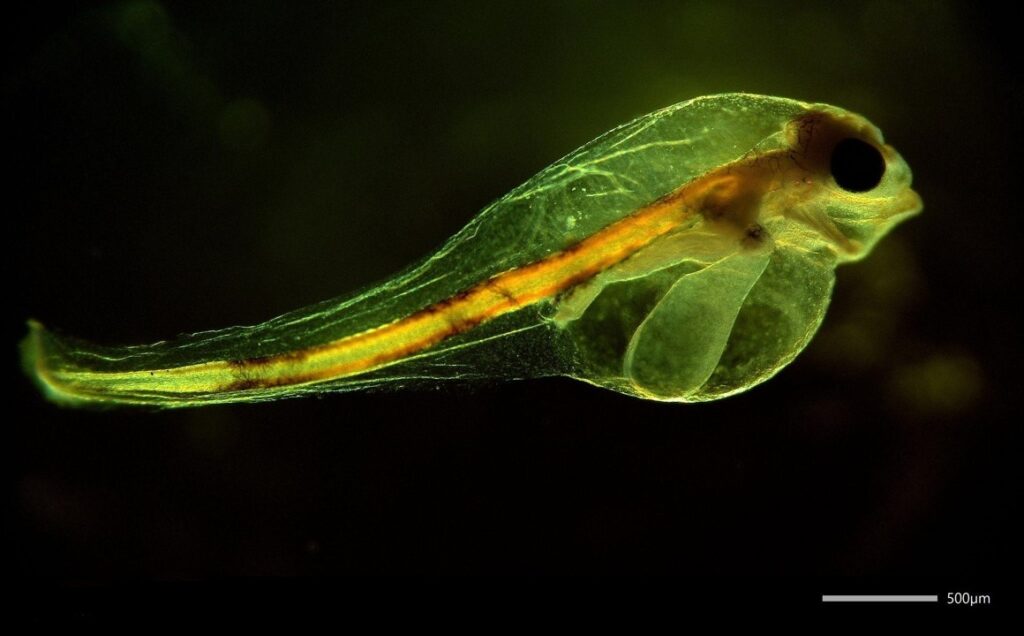
To do this, scientists are interested in cod gene expression at different early life stages – but what does that actually mean? Sebastian explains:

– For instance, when we are hungry, certain genes are activated that signal to the body that we need food. The same is true when an organism is exposed to various stressors, such as low salinity or high temperature.
By studying gene expression, researchers can identify so-called biomarkers – specific genes that show the strongest response to a particular stressor and can thus serve as indicators. The aim is to create a set of biomarkers for the different life stages of cod that can be used to monitor their responses to new environments.
Experiments at the Ar research station
The project started earlier this year and Sebastian and his research team are already well on their way. At the beginning of the summer, they spent two intensive months at the Ar research station in northern Gotland to carry out several controled experiments. By manipulating oxygen, temperature and salinity, the researchers were able to measure the growth and survival of the larvae under different environmental conditions.
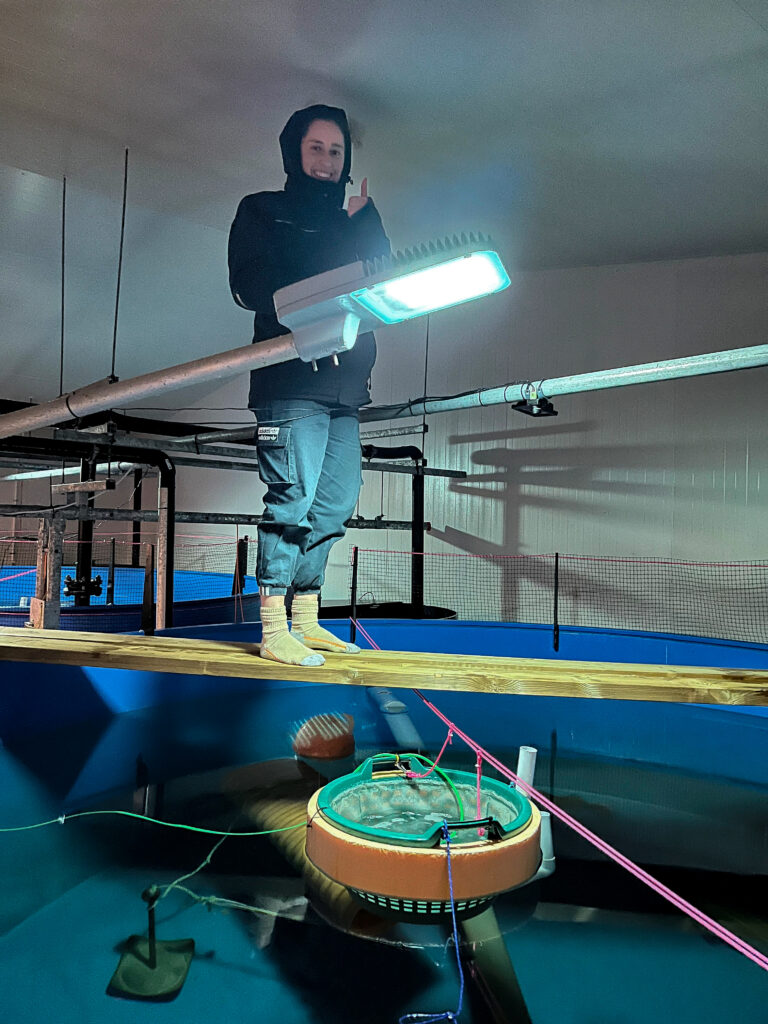
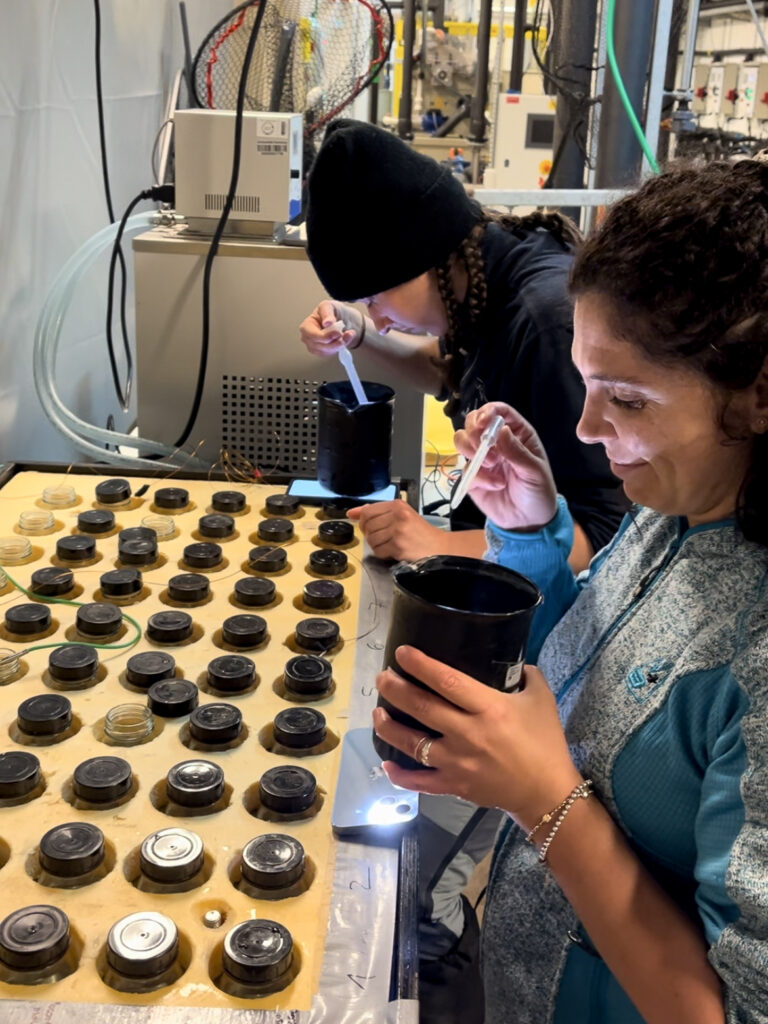
The first experiment of the project investigated the survival of cod larvae in different salinities.
– We simulated the transition from the optimal salinity the larvae are reared in at the research station to the 7 psu that it normally is in the Baltic Sea when they are released,” says Sebastian.
The second experiment tested the sensitivity of cod larvae to different stressors at different life stages – from embryo to fully developed larvae. The larvae were exposed to varying temperature, salinity and oxygen levels to assess how these factors affect them at each stage of their development.
The research team also conducted an experiment to investigate the combined effect of different stressors. The experiment included combinations of low oxygen and low salinity, as well as the effects of low oxygen and salinity in combination with high temperature.
– It is important to understand how the larvae are affected by stressors at the same time, as it reflects the real situation in the Baltic Sea,” says Sebastian.
In the final experiment of the project, the researchers wanted to investigate when genes are activated in the larvae in response to different stressors. The larvae were exposed to low temperature, high temperature, low salinity and high salinity. For each stressor, samples were taken at different time intervals, from 0.5 hours up to 24 hours.
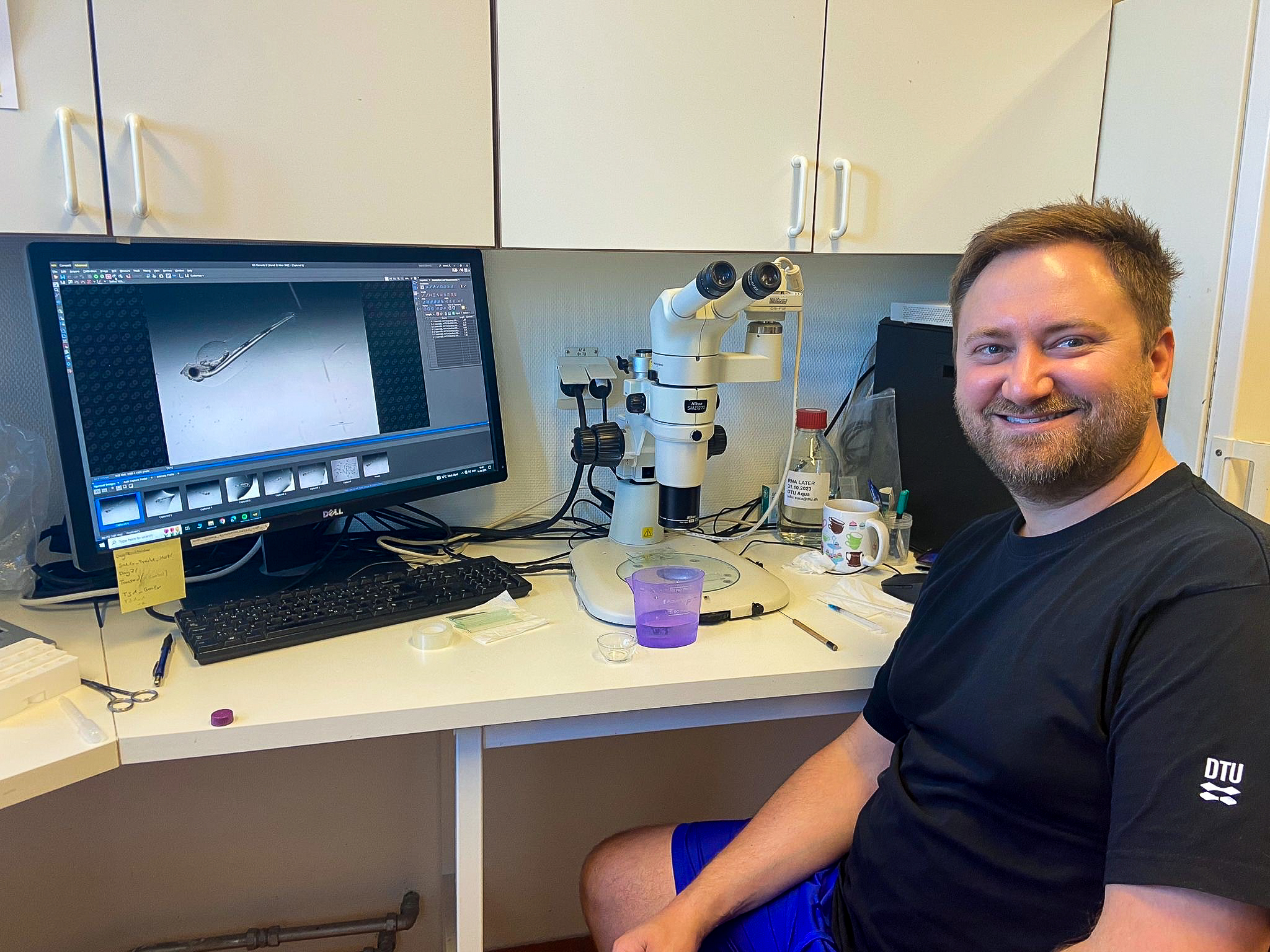
Results with far-reaching effects
With the experiments completed, Sebastian and his research team now have a lot of analysing to do, and hope to complete the work by the end of 2025.
Can we already say something about what to expect from the upcoming results? Sebastian answers:
– By identifying the tolerance limits of different environmental factors at the early life stages of cod, the project will be able to provide guidance on how to best rear, manage and release cod larvae to maximise their survival.
The expected results are thus an important piece of the puzzle for developing the ReCod release methods, not least as the project enters its next phase and takes place at BalticWater’s new research laboratory.
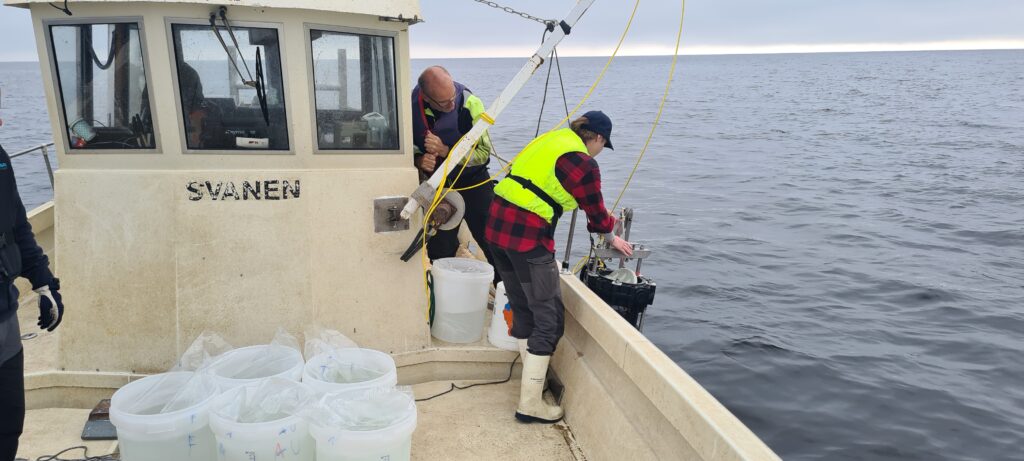
Sebastian also believes that the project can not only help to strengthen the eastern cod stock, but can also spread ripples for research in other areas.
– This knowledge will be of great value for all research focusing on the early life stages of organisms, not just cod, he concludes.
– The project will create a unique knowledge base of biomarkers for different stressors at different early life stages of cod. ‘Instead of examining the entire gene set, we will be able to look at a few genes, explains Sebastian.

More about the project
The project “Baltic Cod Larval physiology thresholds and optima: a Molecular Approach” will be carried out by researchers from the Technical University of Denmark (DTU) and will run until 2025. Through BalticWater’s programme for small research projects and feasibility studies, the project has been awarded a grant of SEK 1,000,000 to support the implementation of the scientific study. You can read more about the five other funded projects in the article Six new research projects for a living Baltic Sea.
About ReCod
ReCod – release of small cod in the Baltic Sea is one of BalticWater’s largest and longest projects, which started in 2020 and is planned to last until 2034 and is divided into three phases.
In 2020 – 2024, stage 1 was carried out at the Ar research station on Gotland – in the middle of the Baltic Sea. The goal of stage 1 has been to conduct trials with releases of 4-6 day old cod larvae at some locations along the east coast. If the trials are successful, there is the possibility of re-establishing cod in the Baltic Sea in more places, which increases the chances of preserving and protecting the unique eastern stock.
ReCod stages 2 and 3 will be operated at BalticWater’s new fish research laboratory from 2025. Cod larvae will be fed for up to 30 days and then to larger fish for release and research. The aim is to find the age and size of fish that have the best chance of surviving in the wild.
ReCod is implemented and funded by BalticWaters, with support from Uppsala University and other partners.
